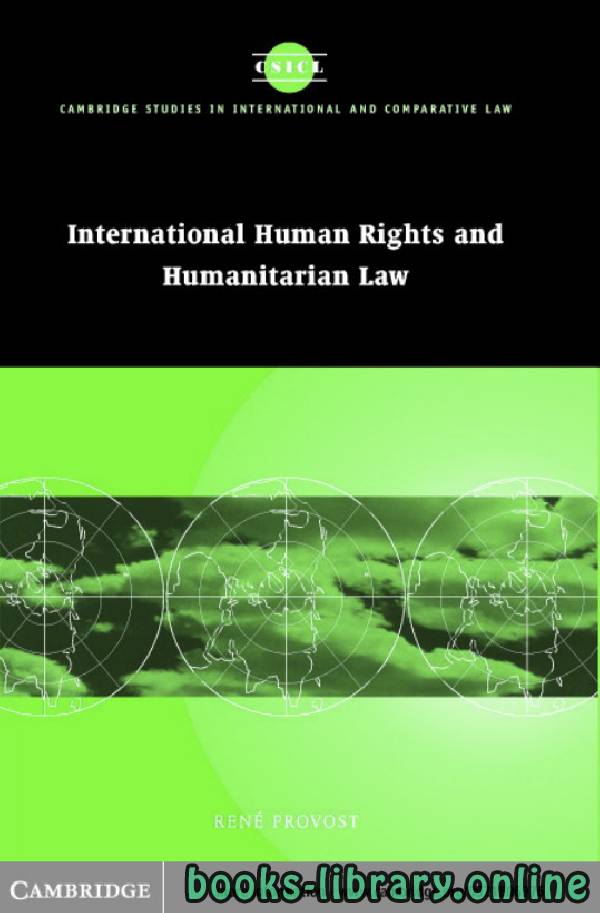📘 قراءة كتاب International Human Rights and Humanitarian Law أونلاين


whose interests are being trampled. We must attempt not only to better
our understanding of why such violations occur, a task primarily carried out by sociologists and political scientists, but also to investigate
what can be achieved with the normative instruments already at our
disposal.
Comparative law’s promise is that, by examining how two legal
systems seek to protect similar interests by way of different norms
or institutions, we achieve a greater understanding of each of these
systems. A comparison of human rights and humanitarian law thus
seems full of potential, as the two systems appear to share, as one
of their central goals, the protection of the integrity of the human
person. One of the by-products of comparative analysis is the possibility
of finding in one system answers which may be borrowed and adapted
to solve challenges faced by another legal system. Such cross-pollination
between human rights and humanitarian law is also made possible by
their similarity. This study undertakes to analyse systemic similarities
and differences between human rights and humanitarian law, to assess
whether and to what extent the promise of comparative law can indeed
be realised in their respect.
The issue of a connection between human rights and humanitarian law
surfaced on the legal and political scene in the late 1960s and early
1970s. Links between the two bodies of law had been discussed from
the end of the Second World War, following the successive adoptions of
the 1948 Universal Declaration of Human Rights and the 1949 Geneva
Conventions. By the late 1960s, humanitarian law stood at a standstill
following the cool reception by the majority of states to the proposal by
the International Committee of the Red Cross for supplementary rules
for the protection of civilian populations in times of war, approved by
the XIXth International Conference of the Red Cross in New Delhi in
1957.1 Human rights law, on the other hand, was experiencing a great
boom, most strikingly with the adoption in 1966 of the International
Covenants on Civil and Political Rights and on Economic, Social and Cultural Rights,2 which concretised into positive norms the ideals embodied
in the Universal Declaration. Given the bleak prospects for a renewed
1 Draft Rules for the Limitation of the Dangers Incurred by the Civilian Population in
Time of War, reprinted in Dietrich Schindler and Jirí Toman, The Laws of Armed Conflict,
3rd edn (Dordrecht: Nijhoff, 1988) 251.
2 16 December 1966, (1966) 999 UNTS 1 and 171, reprinted in Ian Brownlie ed., Basic
Documents on Human Rights, 3rd edn (Oxford: Clarendon, 1992) 114 and 125.
التي يجري دوس مصالحها. يجب أن نحاول ليس فقط لتحسين
فهمنا لسبب حدوث مثل هذه الانتهاكات ، وهي مهمة يقوم بها في المقام الأول علماء الاجتماع وعلماء السياسة ، ولكن أيضًا للتحقيق
ما يمكن تحقيقه مع الصكوك المعيارية بالفعل في موقعنا
تصرف.
وعد القانون المقارن هو ذلك ، من خلال دراسة كيف اثنين قانوني
تسعى الأنظمة إلى حماية المصالح المماثلة عن طريق قواعد مختلفة
أو المؤسسات ، ونحن تحقيق فهم أكبر لكل من هذه
الأنظمة. مقارنة بين حقوق الإنسان والقانون الإنساني
يبدو مليئًا بالإمكانات ، حيث يبدو أن النظامين يتشاركان ، كواحد
من أهدافها المركزية ، وحماية سلامة الإنسان
شخص. أحد النتائج الجانبية للتحليل المقارن هو الاحتمال
من إيجاد في نظام واحد الإجابات التي يمكن استعارتها وتكييفها
لحل التحديات التي يواجهها نظام قانوني آخر. مثل التلقيح المتبادل
بين حقوق الإنسان والقانون الإنساني أصبح ممكنا أيضا من قبل
تشابهها. تتعهد هذه الدراسة بتحليل أوجه التشابه الجهازية
والاختلافات بين حقوق الإنسان والقانون الإنساني ، لتقييم
ما إذا كان وإلى أي مدى يمكن أن وعد القانون المقارن في الواقع
أن تتحقق في احترامهم.
مسألة العلاقة بين حقوق الإنسان والقانون الإنساني
ظهرت على الساحة القانونية والسياسية في أواخر 1960s وبداية
1970s. وقد نوقشت الروابط بين كيان القانون
نهاية الحرب العالمية الثانية ، في أعقاب التبني المتعاقب ل
الإعلان العالمي لحقوق الإنسان لعام 1948 وجنيف 1949
الاتفاقيات. بحلول أواخر الستينيات ، توقف القانون الإنساني عن العمل
بعد استقبال بارد من قبل غالبية الدول على الاقتراح من قبل
لجنة الصليب الأحمر الدولية للقواعد التكميلية
لحماية السكان المدنيين في أوقات الحرب ، التي وافقت عليها
المؤتمر الدولي التاسع عشر للصليب الأحمر في نيودلهي في
1957.1 قانون حقوق الإنسان ، من ناحية أخرى ، كان يعاني من عظيم
الطفرة ، والأكثر لفتا للنظر مع اعتماد في عام 1966 الدولية
العهود الخاصة بالحقوق المدنية والسياسية والحقوق الاقتصادية والاجتماعية والثقافية (2) ، والتي تكرس المثل العليا في المعايير الإيجابية
في الإعلان العالمي. بالنظر إلى احتمالات قاتمة لتجديد
1 مشروع قواعد للحد من المخاطر التي يتكبدها السكان المدنيون في
زمن الحرب ، أعيد طبعه في ديتريش شندلر وجيري تومان ، قوانين الصراع المسلح ،
3rd edn (Dordrecht: Nijhoff، 1988) 251.
2 16 ديسمبر 1966 ، (1966) 999 UNTS 1 و 171 ، أعيد طبعها في Ian Brownlie ed.
الوثائق المتعلقة بحقوق الإنسان ، الطبعة الثالثة (أكسفورد: كلاريندون ، 1992) 114 و 125.
قانون باللغة الانجليزية
كلية القانون بالانجليزي
تعريف القانون العام بالانجليزي
كتابة كلمة قانون بالانجليزي
تخصص قانون بالانجليزي
محامي بالانجليزي
ترجمه القانون بالانجليزي
قانوني بالانجليزي
القانون الانجليزي pdf
مادة مصطلحات قانونية باللغة الانجليزية
تحميل كتاب مصطلحات قانونية باللغة الانجليزية pdf
تحميل قاموس قانوني عربي انجليزي pdf
معجم القانون pdf
مصطلحات القانون الجنائي باللغة الانجليزية
جميع الكلمات القانونية باللغة الانجليزية
تعريف القانون باللغة الانجليزية
سنة النشر : 2004م / 1425هـ .
نوع الكتاب : pdf.
عداد القراءة:
اذا اعجبك الكتاب فضلاً اضغط على أعجبني و يمكنك تحميله من هنا:

شكرًا لمساهمتكم
شكراً لمساهمتكم معنا في الإرتقاء بمستوى المكتبة ، يمكنكم االتبليغ عن اخطاء او سوء اختيار للكتب وتصنيفها ومحتواها ، أو كتاب يُمنع نشره ، او محمي بحقوق طبع ونشر ، فضلاً قم بالتبليغ عن الكتاب المُخالف:
 قبل تحميل الكتاب ..
قبل تحميل الكتاب ..
يجب ان يتوفر لديكم برنامج تشغيل وقراءة ملفات pdf
يمكن تحميلة من هنا 'http://get.adobe.com/reader/'


 منصّة المكتبة
منصّة المكتبة 